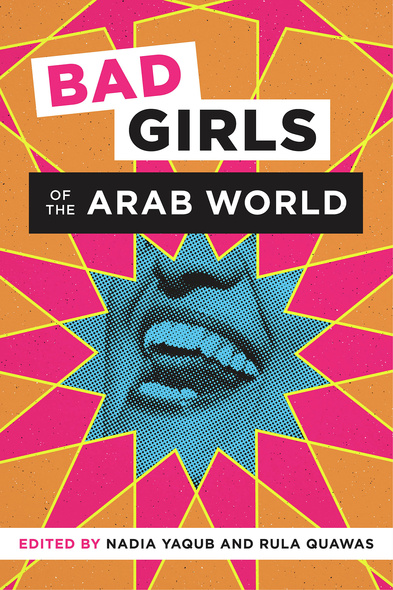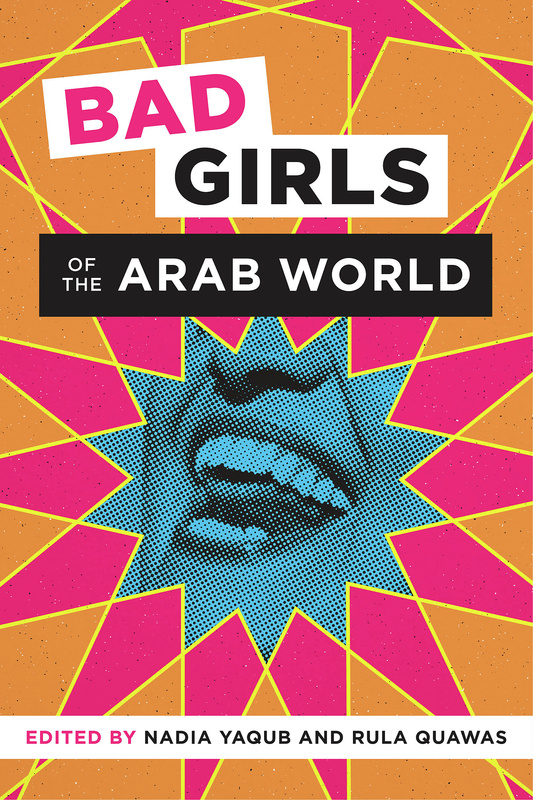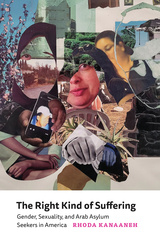
Women’s transgressive behaviors and perspectives are challenging societal norms in the Arab world, giving rise to anxiety and public debate. Simultaneously, however, other Arab women are unwillingly finding themselves labeled “bad” as authority figures attempt to redirect scrutiny from serious social ills such as patriarchy and economic exploitation, or as they impose new restrictions on women’s behavior in response to uncertainty and change in society. Bad Girls of the Arab World elucidates how both intentional and unintentional transgressions make manifest the social and cultural constructs that define proper and improper behavior, as well as the social and political policing of gender, racial, and class divisions.
The works collected here address the experiences of women from a range of ages, classes, and educational backgrounds who live in the Arab world and beyond. They include short pieces in which the women themselves reflect on their experiences with transgression; academic articles about performance, representation, activism, history, and social conditions; an artistic intervention; and afterwords by the acclaimed novelists Laila al-Atrash and Miral al-Tahawy. The book demonstrates that women’s transgression is both an agent and a symptom of change, a site of both resistance and repression. Showing how transnational forces such as media discourses, mobility and confinement, globalization, and neoliberalism, as well as the legacy of colonialism, shape women’s badness, Bad Girls of the Arab World offers a rich portrait of women’s varied experiences at the boundaries of propriety in the twenty-first century.
[A] treasure trove of insightful accounts and research on Arab women who have been voluntarily and involuntarily speaking out after the Arab Spring in 2011. . . . The most exciting portions of this text are the glimpses into the inner workings of Arab culture. This accessible book is a must read.
The collection derives its discursive strength from diverse testimonies of Arab women ranging across age, class, and education. Bad Girls of the Arab World distinguishes itself through its examination of the political and personal, private and public, intentional and imposed dichotomies that women in the Arab world must operate under as they attempt to reformulate their role in society.
[Bad Girls of the Arab World] stands apart from the edited volume crowd. It includes, not only academic entries, but personal essays and reflections on art by their artists, all centered on the theme of transgression, or to put it in the language of Bad Girls of the Arab World itself, bad girls. And there is no one bad girl. Some bad girls of the Arab world use their linguistic and cultural heritage to empower them, some rail against them. Some ally themselves with the West, some don’t think about the West and the East as binaries, but rather, apply a complicated, nuanced worldview to their universes. However, all are allotted their agency.
A most welcome contribution to the field of women's studies. It is relevant to courses that examine representations of women, post-colonial and transnational feminisms, and/or gender in Arab-majority countries.
The chapters in this book are varied in style, including personal experience, academic analysis and artistic contributions; they cover different Arab countries as well as Arab women abroad, different time periods and contexts, but they all converge on disputing, directly or implicitly, Orientalist notions that the oppression of Arab women is rooted in beliefs fundamental to Islam and Arab society.
This academic work explores both the symbolic statements and lived experience of Arab women who transgress social norms, whether intentionally or unintentionally…The strongest chapters break free from the bonds of academic jargon and present women in their full flesh-and-blood selves, often suffering greatly for their brave actions, sometimes with bodily manifestations.
The chapters [in Bad Girls of the Arab World] consistently demonstrate that the consequences of being labeled bad girls are stigmatization, exclusion, and violence. But often embedded in acts of speaking about oppression are acts of resistance...The strength of Bad Girls is prevalent not only in some of its analytic essays but in its inclusion of more creative styles of writing.
This will be a lovely, unusual, and energizing book to teach at the undergraduate level in Middle East and women’s studies courses. There is no other book like it or similar to it.
Nadia Yaqub is an associate professor of Arabic language and culture in the Department of Asian Studies at the University of North Carolina at Chapel Hill. She is the author of Pens, Swords, and the Springs of Art: The Oral Poetry Dueling of Weddings in the Galilee.
Rula Quawas was a professor of American literature and feminist theory at the University of Jordan. Her books included The Voice of Being Enough: Young Jordanian Women Break Through without Breaking Down.
- A Note on Transliteration and Translation
- Foreword by Laura Miller and Jan Bardsley
- Acknowledgments
- Introduction by Nadia Yaqub
- Chapter 1. Inciting Critique in the Feminist Classroom (Rula Quawas)
- Chapter 2. “And Is It Impossible to Be Good Everywhere?” Love and Badness in America and the Arab World (Diya Abdo)
- Chapter 3. Suspicious Bodies: Madame Bomba Performs against Death in Lebanon (Rima Najdi)
- Chapter 4. “Jihad Jane” as Good American Patriot and Bad Arab Girl: The Case of Nada Prouty after 9/11 (Randa A. Kayyali)
- Chapter 5. Paying for Her Father’s Sins: Yasmin as a Daughter of Unknown Lineage (Rawan W. Ibrahim)
- Chapter 6. The Making of Bad Palestinian Mothers during the Second Intifada (Adania Shibli)
- Chapter 7. “They Are Not Like Your Daughters or Mine”: Spectacles of Bad Women from the Arab Spring (Amal Amireh)
- Chapter 8. “Fuck Your Morals”: The Body Activism of Amina Sboui (Anne Marie E. Butler )
- Chapter 9. Syrian Bad Girl Samar Yazbek: Refusing Burial (Hanadi al-Samman)
- Chapter 10. Reel Bad Maghrebi Women (Florence Martin and Patricia Caillé)
- Chapter 11. New Bad Girls of Sudan: Women Singers in the Sudanese Diaspora (Anita H. Fábos)
- Chapter 12. Being a Revolutionary and Writerly Rebel (Suhair al-Tal)
- Afterword by Laila al-Atrash
- Afterword by Miral al-Tahawy
- Contributors
- Index





